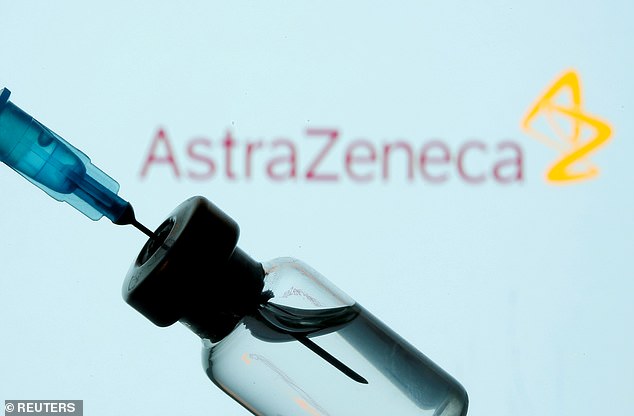Scientists’ fury at ‘completely incorrect’ German claim that Oxford/AstraZeneca Covid vaccine is only 8% effective in elderly people
- German publication Handelsblatt published figure, citing senior sources
- But Oxford University and AstraZeneca have hit back at the claim as ‘incorrect’
- Other scientists have added they have ‘no idea’ where the data has come from
Scientists have slammed the ‘completely incorrect’ claim the Oxford/AstraZeneca coronavirus vaccine is only eight per cent effective in over-65s.
German newspaper Handelsblatt published the figure, citing senior sources in the country’s Government.
But Oxford University has blasted the report saying there was ‘no basis’ for the allegation, and that their data has already been ‘released transparently’.
And scientists said they had ‘no idea’ where the eight per cent number was from, adding that it is not confirmed by research on the vaccine.
It comes as the European Union threatens to block the export of the Pfizer/BioNTech jabs to Britain – which are made in Belgium – after AstraZeneca warned it would not be able to meet an earlier order.
EU health chiefs today demanded drug firms give them warnings when exporting Covid vaccines to countries outside the bloc, meaning American company Pfizer will now have to tell Eurocrats when it wants to send jabs to the UK.
Britain has ordered more than 100million doses of the Oxford/AstraZeneca, which is being administered to top priority groups alongside the Pfizer/BioNTech vaccine.
Ministers are aiming to vaccinate 15million of the most vulnerable by mid-February. This includes the over-70s, vulnerable, care home residents and NHS staff.
Oxford University and AstraZeneca have hit back against claims their vaccine is only eight per cent effective, saying this is ‘completely incorrect’
A spokesman for AstraZeneca has rubbished the claims, saying: ‘Reports that the AstraZeneca/Oxford vaccine efficacy is as low as eight per cent in adults over 65 years are completely incorrect.
‘In the UK, the Joint Committee on Vaccination and Immunisation (JCVI) supported use in this population and MHRA included this group without dose adjustment in the authorisation for emergency supply.
‘In November, we published data in The Lancet demonstrating that older adults showed strong immune responses to the vaccine, with 100 per cent of older adults generating spike-specific antibodies after the second dose.’
An Oxford University spokesman added: ‘There is no basis for the claims of very low efficacy of the Oxford-AstraZeneca vaccine which have been circulating in the media.
‘The results of the clinical trials have already been published transparently in 5 peer-reviewed scientific publications showing similar immune responses in younger and older adults and a good safety profile, and high efficacy in younger adults.
‘Furthermore, the preliminary efficacy data in older adults supports the importance of this vaccine for use in this population.’
Professor Adam Finn, a paediatrician at the University of Bristol who was not involved in developing the jab, also dismissed the claims.
‘I can confirm what is stated about the Lancet paper – I’m not an author on that manuscript but I’ve have read it.
‘Elderly people were recruited to the UK phase 3 relatively late and were relatively well shielded, so there were few cases of COVID that had occurred at the time of submission of data to MHRA for approval.
‘There may have been more by the time of EMA submission. No idea where the eight per cent figure comes from.’
The Department of Health declined to comment on the claims.
